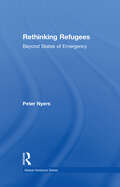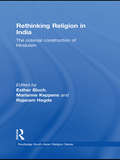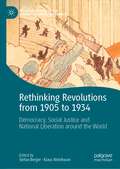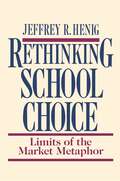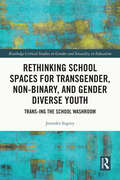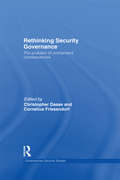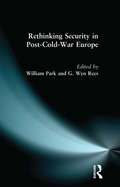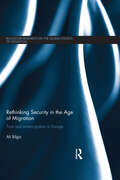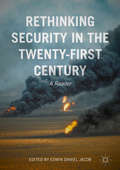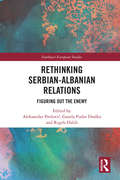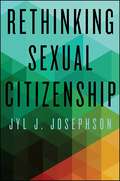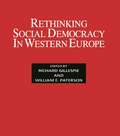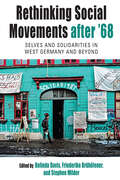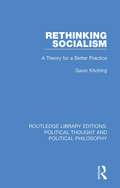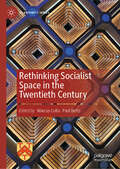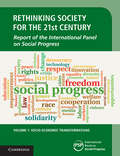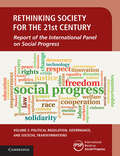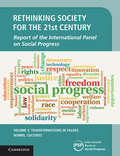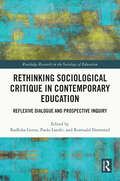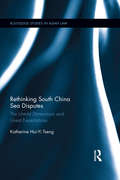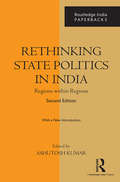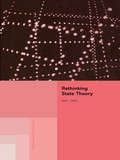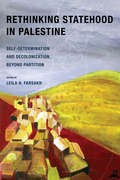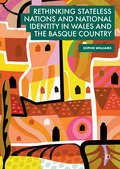- Table View
- List View
Rethinking Refugees: Beyond State of Emergency
by Peter NyersFirst Published in 2006. Routledge is an imprint of Taylor & Francis, an informa company.
Rethinking Religion in India: The Colonial Construction of Hinduism (Routledge South Asian Religion Series)
by Esther Bloch Marianne Keppens Rajaram HegdeThis book critically assesses recent debates about the colonial construction of Hinduism. Increasingly scholars have come to realise that the dominant understanding of Indian culture and its traditions is unsatisfactory. According to the classical paradigm, Hindu traditions are conceptualized as features of a religion with distinct beliefs, doctrines, sacred laws and holy texts. Today, however, many academics consider this conception to be a colonial ‘construction’. This book focuses on the different versions, arguments and counter-arguments of the thesis that the Hindu religion is a construct of colonialism. Bringing together the different positions in the debate, it provides necessary historical data, arguments and conceptual tools to examine the argument. Organized in two parts, the first half of the book provides new analyses of historical and empirical data; the second presents some of the theoretical questions that have emerged from the debate on the construction of Hinduism. Where some of the contributors argue that Hinduism was created as a result of a western Christian notion of religion and the imperatives of British colonialism, others show that this religion already existed in pre-colonial India; and as an alternative to these standpoints, other writers argue that Hinduism only exists in the European experience and does not correspond to any empirical reality in India. This volume offers new insights into the nature of the construction of religion in India and will be of interest to scholars of the History of Religion, Asian Religion, Postcolonial and South Asian Studies.
Rethinking Revolutions from 1905 to 1934: Democracy, Social Justice and National Liberation around the World (Palgrave Studies in the History of Social Movements)
by Stefan Berger Klaus WeinhauerThis edited collection offers a timely and original perspective on the many upheavals and revolutions that broke out across the world during the earlytwentieth century. With previous research tending to confine revolutions within national borders, this book sets out to place them within a broader global sphere of thought and action. The authors explore the time phase between the Russian Revolution of 1905 and the Asturian Revolution of 1934, including cases from South Africa, Australia, China, the Middle East and Latin America. Providing insights from leading scholars in the field, this collection highlights the interconnectedness and transnationalism of upheavals and revolutions, offering a new approach which integrates political, social and cultural history.Chapter 8 is available open access under a Creative Commons Attribution 4.0 International License via Link.springer.com
Rethinking School Choice: Limits of the Market Metaphor
by Jeffrey R. HenigAdvocates of school vouchers and other choice proposals couch their arguments in the fashionable language of economic theory. Choice initiatives at all levels of government have succeeded, it is claimed, because they shift responsibility for education reform from government to market forces. This timely book disputes the appropriateness of the market metaphor as a guide to education policy.
Rethinking School Spaces for Transgender, Non-binary, and Gender Diverse Youth: Trans-ing the School Washroom (Routledge Critical Studies in Gender and Sexuality in Education)
by Jennifer IngreyPositing the washroom as an onto-epistemological site which exemplifies the way in which school spaces govern how gender is experienced, normalized, and understood by youth, this text illustrates how current school policies and practices around bathrooms fail to dismantle cisnormativity and recognize trans lives. Drawing on media-policy analysis, empirical study, and arts-based methodologies, it demonstrates how school spaces must be re-thought via a trans-centred epistemology, to be reflected in teacher education, policy, and curricula. Beginning with a review of the theoretical constellation of the heterotopia and critical trans-ing informing the analysis of data, it moves to offer a critical media and policy analysis of how trans and gender-diverse students are de-limited, erased, or harmed. This position is supported by analysis of empirical data from a school bathroom project, including student photographs of washrooms, and other visual expressions of gender-diverse and gender-complex individuals. These elements—the media-policy analysis, the empirical study, and the archival online material—ultimately combine to offer new justifications for critical trans-informed policies and practices in education that recognize and centre trans and gender-diverse knowledges, expressions, and experiences. Centring the specific and nuanced debates around trans phenomena via an innovative methodology, it makes a unique and extremely timely contribution to the debate on gender-inclusive bathrooms, as well as trans rights to self-identification. As such, it will appeal to scholars, postgraduates, educators, and faculty working in the area of gender and sexuality in education, with interests in trans phenomena.
Rethinking Security Governance: The Problem of Unintended Consequences (Contemporary Security Studies)
by Christopher DaaseThis book explores the unintended consequences of security governance actions and explores how their effects can be limited. Security governance describes new modes of security policy that differ from traditional approaches to national and international security. While traditional security policy used to be the exclusive domain of states and aimed at military defense, security governance is performed by multiple actors and is intended to create a global environment of security for states, social groups, and individuals. By pooling the strength and expertise of states, international organizations, and private actors, security governance is seen to provide more effective and efficient means to cope with today’s security risks. Generally, security governance is assumed to be a good thing, and the most appropriate way of coping with contemporary security problems. This assumption has led scholars to neglect an important phenomenon: unintended consequences. While unintended consequences do not need to be negative, often they are. The CIA term "blowback," for example, refers to the phenomenon that a long nurtured group may turn against its sponsor. The rise of al Qaeda, which had benefited from US Cold War policies, is only one example. Raising awareness about unwanted and even paradoxical policy outcomes and suggesting ways of avoiding damage or limiting their scale, this book will be of much interest to students of security governance, risk management, international security and IR. Christopher Daase is Professor at the Goethe University Frankfurt and head of the research department International Organizations and International Law at the Peace Research Institute Frankfurt (PRIF/HSFK). Cornelius Friesendorf is lecturer at the Goethe University Frankfurt and research fellow at the Peace Research Institute Frankfurt (PRIF/HSFK).
Rethinking Security in Post-Cold-War Europe
by William Park G. Wyn ReesProvides a survey of the principal items on the agenda following the end of the Cold War, focusing upon the institutions and regions where the reconsideration of security issues has been particularly profound. The book is organised into three main sections: the first examines the changed roles of the main security institutions which have survived the Cold War; NATO, the European Union/Western European Union and the Organisation for Security and Cooperation in Europe. The second analyses the Central European countries, Russia and States of the former Soviet Union in terms of their ideologies, political structures and relationships of the Cold War period. Lastly the text examines the northern and southern regions of Europe where quite different perspectives and agendas are concerned.
Rethinking Security in the Age of Migration: Trust and Emancipation in Europe
by Ali BilgicMigration and especially irregular migration are politically sensitive and highly debated issues in the developed world, particularly in Europe. This book analyses irregular protection-seeking migration in Europe, with close attention to sub-Saharan migration into the EU, from the perspective of emancipatory security theory. Some individuals leave their countries because political, social, and economic structures largely fail to provide protection. This book examines how communities respond to migrants who seek protection and security, where migration is perceived as a source of insecurity by many in that community. The central aim of this critical analysis is to explore ideas and practices which can contribute to replacing the political structures of insecurity with emancipatory structures, where individuals (both irregular migrants and members of the receiving communities) enjoy security together, not opposed to each other. Drawing on the security dilemma, critical approaches to security, forced migration and trust, the book demonstrates how common life between two groups of individuals can be politically constructed, in tandem with limitations, risks, and possible handicaps of initiating such a construction in world politics. Rethinking Security in the Age of Migration will be of interest to students and scholars of migration studies, security studies, international relations, European politics and sociology.
Rethinking Security in the Twenty-First Century
by Edwin Daniel JacobThis edited volume helps bridge the elusive gap between theory and practice in dealing with the issue of "security" broadly conceived. A quarter of a century has passed since the crumbling of the Berlin Wall. Yet our notions of security remain mired in Cold War thinking whose realist ethos is predicated on holding the nation state's power, interests, and survival as the guiding unit of analysis in international relations. Security is ever changing. Confronting new dangers to the individual, the state, and the international order calls for new categories that speak to the new influence of globalization, international institutions, and transnational threats. Composed of original essays by a cosmopolitan mix of leading figures inside and outside the academy, this book proves relevant to any number of classes and courses, and its controversial character makes it all the more necessary and appealing.
Rethinking Serbian-Albanian Relations: Figuring out the Enemy (Southeast European Studies)
by Aleksandar Pavlović Gazela Pudar Draško Rigels HaliliIdentifying and explaining common views, ideas and traditions, this volume challenges the concept of Serbian-Albanian hostility by reinvestigating recent and historical events in the region. The contributors put forward critically oriented initiatives and alternatives to shed light on a range of relations and perspectives. The central aim of the book is to ‘figure out’ the problematic relations between Serbs and Albanians – that is, to comprehend its origins and the actors involved, and to find ways to resolve and deal with this enmity. Treating the hostility as a construct of a long-running discourse about the Serbian or Albanian ‘Other’, scholars and intellectuals from Serbia, Kosovo and Albania examine the origins, channels, agents and mediums of this discourse from the 18th century to the present. Tracing the roots of the two ethnic groups' political divisions, contemporary practices and actions allows the contributors to reconsider mutually held negative perceptions and identify elements of a common, shared history. Examples of past and current cooperation are used to offer a critical analysis of all three societies. This interdisciplinary publication brings together historiographical, literary, sociological, political, anthropological and philosophical analyses and enquiries and will be of interest to researchers in the fields of sociology, politics, cultural studies, history or anthropology; and to academics working in Slavonic and East European studies.
Rethinking Sex: A Provocation
by Christine EmbaPart searing examination, part call to arms—a bold case against modern sexual ethics, from young Washington Post columnist Christine Emba.For years now, modern-day sexual ethics has held that &“anything goes&” when it comes to sex—as long as everyone says yes, and does so enthusiastically. So why, even when consent has been ascertained, are so many of our sexual experiences filled with frustration, and disappointment, even shame? The truth is that the rules that make up today&’s consent-only sexual code may actually be the cause of our sexual malaise—not the solution. In Rethinking Sex, reporter Christine Emba shows how consent is a good ethical floor but a terrible ceiling. She spells out the cultural, historical, and psychological forces that have warped our idea of sex, what is permitted, and what is considered &“safe.&” In visiting critical points in recent years—from #MeToo and the Aziz Ansari scandal, to the phenomenal response to &“Cat Person&”—she reveals how a consent-only view of sex has hijacked our ability to form authentic and long-lasting connections, exposing us further to chronic isolation and resentment. Reaching back to the wisdom of thinkers like Thomas Aquinas and Andrea Dworkin, and drawing from sociological studies, interviews with college students, and poignant examples from her own life, Emba calls for a more humane philosophy, one that starts with consent but accounts for the very real emotional, mental, social, and political implications of sex—even, she argues, if it means saying no to certain sexual practices or challenging societal expectations altogether. More than a bold reassessment of modern norms, Rethinking Sex invites us to imagine what it means to will the good of others, and in turn, attain greater affirmation, fulfillment, and satisfaction for ourselves.
Rethinking Sexual Citizenship (SUNY series in Queer Politics and Cultures)
by Jyl J. JosephsonPublic policy often assumes there is one correct way to be a family. Rethinking Sexual Citizenship argues that policies that enforce this idea hurt all of us and harm our democracy. Jyl J. Josephson uses the concept of "sexual citizenship" (a criticism of the assumption that all families have a heterosexual at their center) to show how government policies are made to punish or reward particular groups of people. This analysis applies sexual citizenship not only to policies that impact LGBTQ families, but also to other groups, including young people affected by abstinence-only public policies and single-parent families affected by welfare policy. The book also addresses the idea that the "normal" family in the United States is white. It concludes with a discussion of how scholars and activists can help create a more inclusive democracy by challenging this narrow view of public life.
Rethinking Social Democracy in Western Europe
by Richard Gillespie William E. PatersonFirst published in 1993. Routledge is an imprint of Taylor & Francis, an informa company.
Rethinking Social Movements after '68: Selves and Solidarities in West Germany and Beyond (Protest, Culture & Society #31)
by Belinda Davis, Friederike Brühöfener, and Stephen MilderThe year 1968 has widely been viewed as the only major watershed moment during the latter half of the twentieth century. Rethinking Social Movements after ’68 takes on this conventional approach, exploring the spaces, practices, organization, ideas and agendas of numerous activists and movements across the 1970s and 1980s. From the Maoist Communist League to the women’s movement, youth center movement, and gay liberation movement, established and emerging scholars across Europe and North America shed new light on the development of modern European popular politics and social change.
Rethinking Socialism: A Theory for a Better Practice (Routledge Library Editions: Political Thought and Political Philosophy #32)
by Gavin KitchingFirst published in 1983. Socialism was generally unpopular in Britain in the 1980s. The Left needed new ideas and fresh approaches if it was ever to escape its isolation from the mainstream of political and cultural life. Rethinking Socialism brought such a perspective to socialist thought and practice in Britain. Gavin Kitching contended that the unpopularity of the Left was not due primarily to the pernicious influence of the press and media, as many socialists argued, but reflected fundamental changes in the British social structure and, above all, the simple incredibility and irrelevance of many socialist beliefs and policies. He also claims that socialism will continue to be unpopular so long as it is divorced from the values and concerns of the majority of British people. Kitching shows how basic and obvious facts about Britain, and other advanced capitalist countries, were ignored or wished away, and how crucial lessons of the Soviet and East European experience had not been learnt. He argues that radical politics in Britain both reflected and reinforced a ‘ghetto’ mentality bred by the Left’s political and intellectual isolation. The book is more than just a critique, however; it presented as well a more relevant and popular alternative strategy for the Left. This focused on extending and deepening political and economic democracy, and aimed to preserve the benefits which people had derived from capitalism and parliamentary democracy while extending them and thus transforming the system that conferred them.
Rethinking Socialist Space in the Twentieth Century (St Antony's Series)
by Paul Betts Marcus CollaThis edited collection explores the problem of space under socialist regimes in the twentieth century. Bringing together contributions from international scholars with expertise in the architectural, urban, social, and cultural history of twentieth-century socialism, the book includes examples from China, Africa, Mongolia, Eastern Europe and the USSR. The volume reflects on how developments in the field over the past two decades have altered our understanding of how such spaces were constructed (both literally and discursively), how they could become sites of contested meanings, and how they were perceived outside the socialist world. Moreover, the volume is concerned with how scholarly approaches associated with post-colonialism, global history, gender history, and the ‘temporal’ and ‘sensory’ turns have reconfigured our knowledge of, and approach to, the history of socialist space.
Rethinking Society for the 21st Century: Report of the International Panel on Social Progress
by International Panel on Social ProgressThis is the first of three volumes containing a report from the International Panel on Social Progress (IPSP). The IPSP is an independent association of top research scholars with the goal of assessing methods for improving the main institutions of modern societies. Written in accessible language by scholars across the social sciences and humanities, these volumes assess the achievements of world societies in past centuries, the current trends, the dangers that we are now facing, and the possible futures in the twenty-first century. It covers the main socio-economic, political, and cultural dimensions of social progress, global as well as regional issues, and the diversity of challenges and their interplay around the world. This particular volume covers topics such as economic inequality and growth, finance and corporations, labor, capitalism, and social justice.
Rethinking Society for the 21st Century: Report of the International Panel on Social Progress
by International Panel on Social ProgressThis is the second of three volumes containing a report from the International Panel on Social Progress (IPSP). The IPSP is an independent association of top research scholars with the goal of assessing methods for improving the main institutions of modern societies. Written in accessible language by scholars across the social sciences and humanities, these volumes assess the achievements of world societies in past centuries, the current trends, the dangers that we are now facing, and the possible futures in the twenty-first century. It covers the main socio-economic, political, and cultural dimensions of social progress, global as well as regional issues, and the diversity of challenges and their interplay around the world. This particular volume covers topics such as democracy and the rule of law, violence and wars, international organizations and global governance, and media and communications.
Rethinking Society for the 21st Century: Report of the International Panel on Social Progress
by International Panel on Social ProgressThis is the third of three volumes containing a report from the International Panel on Social Progress (IPSP). The IPSP is an independent association of top research scholars with the goal of assessing methods for improving the main institutions of modern societies. Written in accessible language by scholars across the social sciences and humanities, these volumes assess the achievements of world societies in past centuries, the current trends, the dangers that we are now facing, and the possible futures in the twenty-first century. It covers the main socio-economic, political, and cultural dimensions of social progress, global as well as regional issues, and the diversity of challenges and their interplay around the world. This particular volume covers topics such as world cultures and religions, families, global health, education, and the contributions of social sciences to institutional change.
Rethinking Sociological Critique in Contemporary Education: Reflexive Dialogue and Prospective Inquiry (Routledge Research in the Sociology of Education)
by Romuald Normand Paolo Landri Radhika GorurThis book explores a new repertoire for critique in the sociology of contemporary education, focusing on emerging social theories that respond to contemporary challenges in education, education policy and governance. Presenting a variety of approaches in the sociology of education including pragmatist critical sociology, neo-Marxism, post-digital sociology, new materialisms, affirmative critique of education, and post-colonial studies, the chapters in this book engage in a novel, collective dialogue and reflection on the affordances, limitations and challenges of emerging social theories in contemporary education. The book further justifies this novel approach through inclusion of a series of interviews with leading scholars and thinkers from within and outside the field of education on the subject of critique in contemporary society and education. The book offers relevant global and decolonial perspectives to study current transformations, drawing on innovations in theorizing and empirical illustrations from different countries. Highlighting alternative visions of these transformations in an era of globalization, fragmentation, and growing nationalism, this cutting-edge book will be of great interest to researchers, academics and postgraduate students in the fields of the sociology of education, the philosophy of education, social theory, political science and comparative policy and politics more broadly.
Rethinking South China Sea Disputes: The Untold Dimensions and Great Expectations (Routledge Studies in Asian Law)
by Katherine Hui-Yi TsengThe proposed book draws on the on-going South China Sea dispute, and the multifaceted challenges wrought by the South China Sea issue that requires an inter-disciplinary perspective. It employs legal-analytical methods, to emphasize the nuances of the role and interpretation of international law and treaties by China in different periods, while taking into account policy and strategic concerns, which generally cast great sways in decision-making. The re-introduction of interdisciplinary concerns straddling law and history illustrates that the historical dimension, which has long been neglected, is an emerging concern that poses looming dangers that may unexpectedly radicalize the friction. Contributing to debunking the mystique wrought by confrontations between a historical and a law-dominated perspective, these perspectives are supported by a more nuanced analytical framework, featuring theoretical concerns with a tinge of practicality. The South China Sea Dispute aims to unveil a nuanced evolution of the issue with a confluence of inter-temporal law, policy and maritime practices in the South China Sea.
Rethinking State Politics in India: Regions within Regions
by Ashutosh KumarIn recent decades, India has been witness to the assertion of geographically, culturally and historically constituted distinct and well-defined regions that display ethnic, communal, caste and other social–political cleavages. This book examines the changing configurations of state politics in India. Focussing on identity politics and development, it explores the specificities of the regions within states — not merely as politico-administrative constructs but also as conceived in historical, geographic, economic, sociological or cultural terms. Adopting a comparative approach, the book looks at alternative theoretical approaches — the quest for homeland, identity, caste politics and public policy. This second edition includes a new Introduction that updates the research in the area, while further developing the theoretical framework. One of the first major volumes on federalism in India, including studies from across the nation, this book will be indispensable for students and scholars of political science, sociology, history and South Asian studies.
Rethinking State Theory (Routledge Innovations in Political Theory #3)
by Mark J. Smith Mark J SmithIn the last two decades, objects of analysis such as 'the state' have increasingly been seen as uncertain and contested theoretical concepts. Mark J. Smith presents a counter argument that highlights how existing theoretical approaches can provide useful tools for understanding contemporary political developments.
Rethinking Statehood in Palestine: Self-Determination and Decolonization Beyond Partition (New Directions in Palestinian Studies #4)
by Leila H. FarsakhA free open access ebook is available upon publication. Learn more at www.luminosoa.org. The quest for an inclusive and independent state has been at the center of the Palestinian national struggle for a very long time. This book critically explores the meaning of Palestinian statehood and the challenges that face alternative models to it. Giving prominence to a young set of diverse Palestinian scholars, this groundbreaking book shows how notions of citizenship, sovereignty, and nationhood are being rethought within the broader context of decolonization. Bringing forth critical and multifaceted engagements with what modern Palestinian self-determination entails, Rethinking Statehood sets the terms of debate for the future of Palestine beyond partition.
Rethinking Stateless Nations and National Identity in Wales and the Basque Country
by Sophie WilliamsThis book looks at the fundamental components of national identity as understood by ordinary nation members, and the way in which it is mobilised by political elites. Drawing on an original case comparison between Wales and the Basque Country, the author suggests there are many commonalities between these two nations, particularly around the fundamentals of their national identities. However, differences occur in terms of degree of intensity of feeling and around the politicisation of identity, with more entrenched and hostile political positioning in the Basque Country than Wales. Through a multi-level comparison, the book generates insights into national identity as a theoretical concept and in a ‘stateless nation’ context. It argues for national identity's intangible, yet polemical, nature, looking at the primordialist way it is understood, its permanence and importance, coupled with its lack of everyday salience and consequent obligations.
